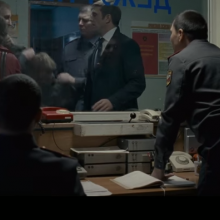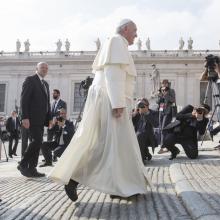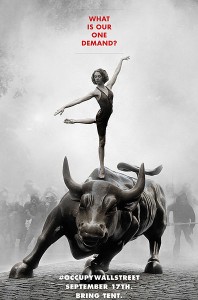Corruption
When we meet Kolya, the film’s protagonist, he’s in the midst of a long legal battle. He’s about to lose the house he built to the town’s mayor, a paranoid man obsessed with his own job security. Kolya’s already lost in court, but enlists the help of former army buddy Dimitri, a high-powered lawyer, to help him with an appeal. After the appeal’s failure, and some nasty bullying from local officials, Kolya is hit with a seemingly endless avalanche of humiliation and personal catastrophes.
The fishing village depicted in the film is a run-down hamlet characterized by an impressive amount of skeletal remains — and not just the kind that live in the closet. It’s strewn with ruined buildings, wrecked boats, and massive whale skeletons. In our world, the best architecture serves as a testament to man’s accomplishments, but the buildings and bones of Leviathan do exactly the opposite. They’re a constant reminder of decay and the temporary nature of what we mere mortals spend so much energy building and fighting over. Leviathan’s target is corruption in Russia, but its themes of pride, personal struggle, and frustration are universal.
VATICAN CITY — Pope Francis launched a blistering attack on the Vatican bureaucracy on Monday, outlining a “catalog of illnesses” that plague the church’s central administration, including “spiritual Alzheimer’s” and gossipy cliques.
The pope’s traditional Christmas greeting to the cardinals, bishops and priests who run the Holy See was more “Bah! Humbug!” than holiday cheer as he ticked off a laundry list of “ailments of the Curia” that he wants to cure.
In a critique that left many of the assembled clerics clearly uncomfortable, the 15 ailments in Francis’ “catalog of illnesses” reflected the take-no-prisoners approach he promised when he was elected nearly two years ago as an outsider with little direct experience in Rome.
“The Curia is called upon to improve itself, always improve itself and grow in communion, holiness and knowledge to fully realize its mission,” the pope said.
“Yet like every body, like every human body, it is exposed to illnesses, malfunctioning, infirmity. They are illnesses and temptations that weaken our service to God.”
In a separate address to Vatican staff later, Francis begged pardon for the “shortcomings” of senior church leaders, as well as the “several scandals” that had “caused so much harm,” without specifying which scandals he had in mind.
IN ITS SEEMINGLY endless quest to attack the few remaining pillars of our campaign finance laws, the Supreme Court issued a brazen ruling in McCutcheon vs. FEC, striking down the aggregate contribution limits that capped the overall amount individuals could give to candidates and political parties each election cycle. As it was with Citizens United—the 2010 decision that said corporations and unions could spend unlimited amounts—the court’s April ruling was striking not only in its naiveté about the effect of money in politics, but in its naiveté about the nature of the American experiment itself.
Whereas Citizens United focused on the nature of corporate spending in elections, this decision cuts straight to the chase. Should wealthy people have a greater ability to fund political parties and candidates—and benefit from the greater access and influence that awards them? The court sent a clear message about where it stands: Yes, they should. Chief Justice John Roberts, writing for the majority, even cloaked the decision in pious language, stating, “if the First Amendment protects flag burning, funeral protests, and Nazi parades ... it surely protects political campaign speech despite popular opposition.”
Traditionally the court has asserted that the government has an interest in preventing corruption and the appearance of corruption, the latter in order to sustain public faith in the democratic process. However, the McCutcheon decision defines “corruption” so narrowly that the original statute is essentially useless. The government can no longer prevent the appearance of corruption, and it would have a difficult time proving “quid-pro-quo corruption” occurred in the first place
But despite this disheartening fact, there’s a glimmer of hope. One of the unintended effects of Citizens United was that it created a major “teachable moment” for the public about campaign finance—an issue that had previously gained little attention and was easily misunderstood.
Yesterday, the Supreme Court struck down a law that limited the amount of money that an individual can contribute to political campaigns in a two-year election cycle, while upholding the limit that an individual can give to a single campaign in the same period. Previously, the law limited total individual contributions to all political campaigns to $48,600, while capping individual donations to a single campaign at $2,600.
The bottom line of yesterday's McCutcheon v. Federal Election Commission ruling is that there will be more money in politics, as the Court doubles down on the controversial 2010 Citizens United v. Federal Election Commission ruling that allowed unlimited, anonymous expenditures by outside groups on election activities. Those with resources can now contribute up to $2,600 in all 435 congressional districts, more than 30 Senate races, and the presidential election, while at the same time giving millions more to Super PACs in support of these candidates.
The ruling will give more influence to corporate and labor lobbyists whose groups contribute to political campaigns. It is still illegal to give a donation that explicitly requests a legislative action in return for the contribution. But while politicians spend hours every week making phone calls soliciting contributions, they aren’t likely to forget who is funding their political future. When they hang up the phone and meet a lobbyist in their office whose group is funding their campaign, there is an unspoken understanding that the politician will be more open to the idea that lobbyist is presenting.
In the Khayelitsha township near Cape Town, Baphumelele Respite Care Centre and Clinic serves abandoned children as well as ill adults. The staff faces daily the anguish of caring for babies and older children with serious congenital alcohol and drug syndrome or HIV/AIDS complications. A compassionate professional team and scores of volunteers provide education and rehabilitative residential care for countless patients and support to child headed homes.
A nurse friend on the staff gave witness to the disparity between day-to-day realities when faced with the inadequate response by government and societal leaders. It is stunningly the case in South Africa in the post-Mandela era. The clinic was started in 1989 by the local founding-director Rosealia Mashale, “Rosie,” who could not abandon vulnerable children to the trash heap.
Even with more than 25 similar agencies active in the sprawling location of mostly substandard housing and services there are thousands still in need.
Professor Jonathan Jansen, a trusted commentator in South Africa and author of We Need to Act, reminds citizens to leave their comfort zones and contribute to righting the wrongs of society
"Did you think I’d forgotten you? Perhaps you hoped I had. Don’t waste a breath mourning ... For those of us climbing to the top of the food chain there can be no mercy. There is but one rule. Hunt or be hunted." - Francis Underwood
So ends the Shakespearean soliloquy at the end of the first episode of House of Card's highly anticipated second season.
Underwood lives by a very clear code of ethics: Get to the top and do whatever is necessary to achieve that goal. For him, the end always justifies the means. And so, although it certainly made me wince to see what happens in Season 2's opening episode, I was left in awe at the show’s brutal honesty of what a life purely committed to power potentially looks like.
Some scenes perhaps strike us viewers as far from reality (Washington can't really be that bad, can it?!?), but other vignettes are far more plausible. Consider Underwood’s commendation of a congresswoman for making the cold, calculated decision to “do what needed to be done” by wiping out entire villages with missile strikes.
Her “ruthless pragmatism” merely makes Underwood smirk.
ON A BLAZING August day last summer, Rosa Pérez Triana faced a crowd of several hundred people in downtown Tucson and held up a color photo of a pretty young woman.
“This is my daughter, Coral,” Pérez said in Spanish, her voice breaking. “A year ago she went missing. There are thousands of people in Mexico like me who don’t know what happened to their loved ones.”
A middle-aged woman from the violent state of Nuevo León in northern Mexico, Pérez had come to the United States with the Caravan for Peace with Justice and Dignity to tell her North American neighbors what had happened to her daughter—and to an estimated 80,000 other Mexicans who have been killed or disappeared during the country’s six-year-old war on drugs.
Her daughter’s story is typical. Guadalupe Coral Pérez Triana vanished on July 24, 2011, somewhere on the road between Reynosa, Tamaulipas, and Monterrey, Nuevo León. Five other young women were traveling with her. All are missing and presumed dead.
“The main purpose of the caravan is to show a human face,” explained Laura Carlsen, director of the Center for International Policy’s Americas Program in Mexico, who joined the caravan on its last leg through the East Coast. “These are people whose family members were victims.” Such are the human costs of the war on drugs that the U.S. government supports with arms and money.
IN OUR DEMOCRACY, the first Tuesday in November is supposed to be an election. Unfortunately, it is turning into an auction, with government for sale to the highest bidders. Powerful interest groups buy clout with big campaign contributions.
Recently, the billionaire owner of the Minnesota Vikings persuaded the Minnesota legislature to build a new stadium with public funds. It was an enormous gift: It works out to a $72 taxpayer subsidy for every ticket, to every game, for the next 30 years!
This huge subsidy passed with votes from legislators of both parties, despite strong public opposition. Along with a multimillion lobbying campaign over the past decade, the Vikings owner, Zygi Wilf, with his family and lobbyists, contributed thousands of dollars to the Republican legislative caucuses and the Republican gubernatorial and legislative candidates.
They also contributed thousands of dollars to the Democratic legislative caucuses and the Democratic gubernatorial and legislative candidates. Why would they give to both parties and even to candidates running against each other? They say it is because their interests are bipartisan. Perhaps this might be more appropriately spelled “buy-partisan,” since they were trying to buy favor with both parties.
Did those contributions make a difference? Imagine what would happen if Wilf tried the same strategy to get his way at an NFL game and made $1,000 or $1,500 “contributions” to each of the referees before the next Vikings-Packers game. The NFL would kick Wilf and his team off the field and fire the officials without waiting for proof that the money affected the officiating. The conflict of interest is obvious.
EDITOR'S NOTE: Each month, Sojourners send out a Faith & Justice Newsletter to folks who are interested in intersection of faith and social action. This month, we pulled content from the magazine and our blogs relating to the corruption of the common good. Enjoy.
This year’s election cycle is expected to cost more than $6 billion -- the most expensive in U.S. history. During election years, members of Congress spend on average 40 to 70 percent of their time fundraising. One quarter of one percent (.25 percent) of donors provided two-thirds of all the campaign cash spent during the 2010 election. In a recent article for Sojourners, Nick Penniman argues the problem is only going to get worse.
This influx of campaign cash and the influence of special interests in Washington should cause even the most idealistic citizen to ask whether our politicians have completely lost sight of the common good. If the basis of democracy is each person having an equal voice in government and having her or his interests weighed equally by elected officials, then democracy in the United States appears to be profoundly broken.
Christians need to wrestle with these questions and discern how we’re called to respond. While our hope resides firmly in Jesus Christ, we can’t ignore the power of government to protect the poor and improve the lives of millions. The command to love our neighbor as ourselves means we cannot ignore the corruption of the common good.
I finished up my taxes last night. I didn’t think much of the hour I spent on the phone with my dad making sure I filed correctly. Taxes are always complicated, right?
Well, maybe that’s because the folks at Intuit (the publishers of TurboTax) want them to be.
Matt Stoller over at Republic Report pointed out that the ReadyReturn program in California sends tax payers a form showing how much they owe in taxes. Then they just sign it and send it back. It costs less for the state to process and it saves tax payers a lot of time.
During the 2008 campaign, President Barack Obama promised to implement something similar on the federal level. What happened?
Stoller also notes that since 2008, Intuit has spent a good $9 million on lobbying. And according to one of their investor reports, keeping taxes complicated is a top priority:
Our consumer tax business also faces significant competition from the public sector, where we face the risk of federal and state taxing authorities developing software or other systems to facilitate tax return preparation and electronic filing at no charge to taxpayers. These or similar programs may be introduced or expanded in the future, which may cause us to lose customers and revenue. For example, during tax season 2010, the federal government introduced a prepaid debit card program to facilitate the refund process. Our consumer and professional tax businesses provide this service as well.
If that doesn’t make you mad, take a look at why you are probably paying $500 more a year for your cell phone then you should be.
Finally, as President Obama has announced, this American war will soon be over, with most of the 44,000 American troops still in Iraq coming home in time to be with their families for Christmas.
The initial feelings that rushed over me after hearing the White House announcement were of deep relief. But then they turned to deep sadness over the terrible cost of a war that was, from the beginning, wrong; intellectually, politically, strategically and, above all, morally wrong.
The War in Iraq was fundamentally a war of choice, and it was the wrong choice.
As Christians we have a decision to make. In times of hopelessness and long periods of waiting for things to get better, will we let ourselves be cast into the all-consuming fires of idolatry?
Or, will we stand up against the false gods and catch the flame of the Spirit in our hearts and minds?
Our nation may very well be on the threshold of a crucial change. Who will you be standing with?
As we waste time fanning capitalism's raging inferno, the best parts of ourselves remain frozen.
I had seen people my age start successful businesses, become pop-stars and even play a key role in partisan political campaigns, but I had never seen them develop and sustain a social movement.
Sure there have been more focused shifts around issues like educational equity, LGBT rights or global poverty that my generation has had a hand in shaping, but nothing that quite had the look or the feel of what I imagined the anti-War or Civil Rights movements of the 1960s to have been. I assumed we -- my contemporaries ( I'm 27) -- simply didn't possess the interest or the will-power to accomplish something that big.
I was wrong.
From the official statement by #OccupyWallStreet: "As one people, united, we acknowledge the reality: that the future of the human race requires the cooperation of its members; that our system must protect our rights, and upon corruption of that system, it is up to the individuals to protect their own rights, and those of their neighbors; that a democratic government derives its just power from the people, but corporations do not seek consent to extract wealth from the people and the Earth; and that no true democracy is attainable when the process is determined by economic power."
Did you watch any of the health-care summit yesterday in Washington? Guess what? The Republicans and Democrats are divided and likely can't find any common ground.








